In this article, we’ll take a look at some sustainable and slow fashion clothing brands that men can buy from this year and beyond.
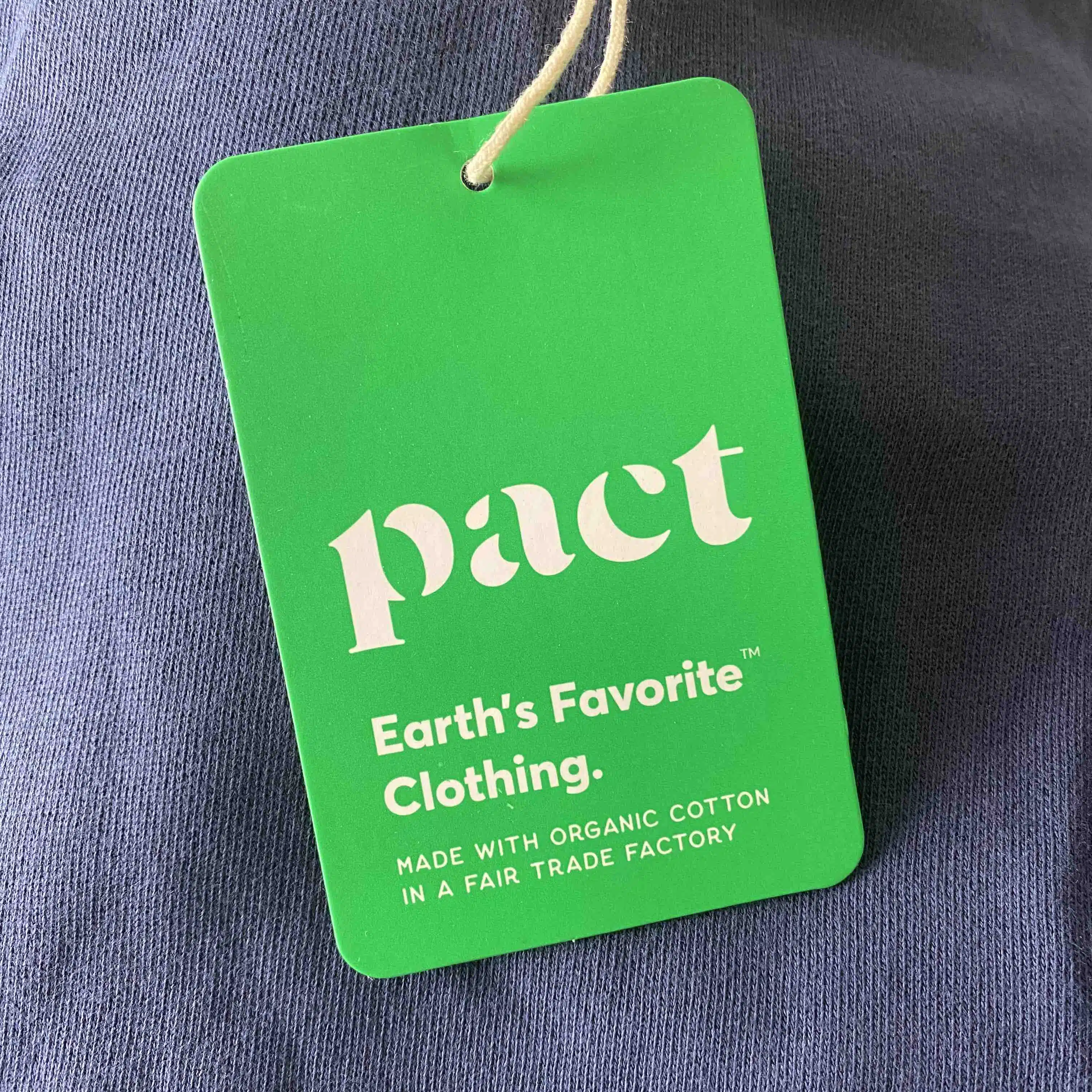
Consumers have become increasingly aware of the power of their buying dollar and choose to support companies that combine quality products with ecological and social awareness. Many companies were created, and are thriving, with those two goals in mind.
Slow Fashion Clothing Brands for Men
Ethical and sustainable fashion has become more mainstream. Today, 59% of consumers expect retailers to create clothes that are both ethical and sustainable. Luckily, this growing demand means that it’s much easier to find stylish, quality clothing that you can feel good about wearing.
The companies below will inspire you with their stories, comfort you with their clothes, and encourage you to make a difference.
United By Blue
United By Blue is a sustainable and ethical company that sells a full range of products for men, women, children and your home.
They are a B-Certified corporation, featuring organic textiles in a wide array of clothing that is made with comfortable stretch, yet will hold up to rugged trips.
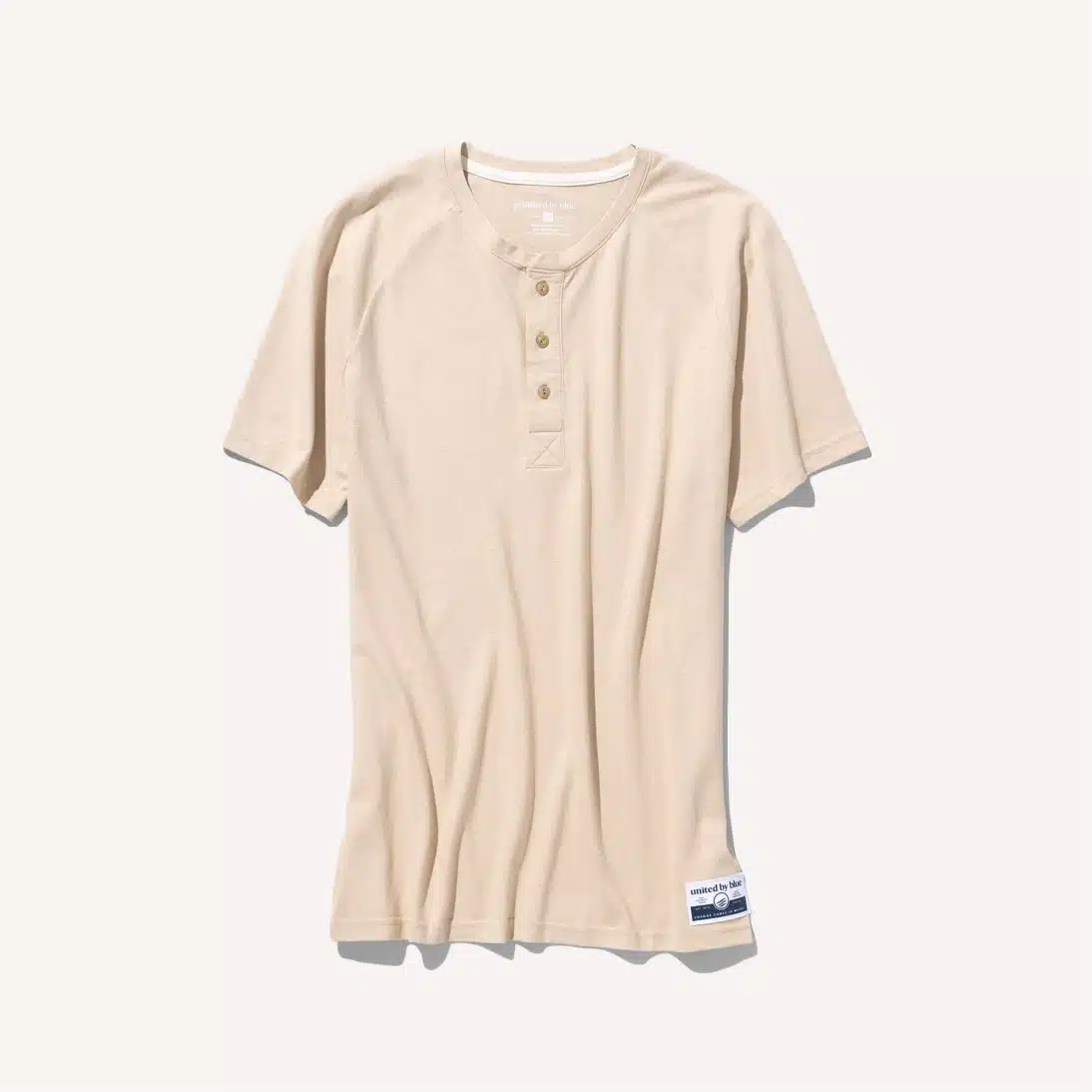
Fabrications include hemp, organic cotton, as well as some more high-tech fabrics. Their commitment to ecological friendliness extends to using vegetable dyes.
Buttons are biodegradable Corozo made from Tagua Palm nuts; each tree produces 50 pounds of nuts per year and can live for 100 years. United By Blue’s signature fabrics include:
- Repreve™ – recycled polyester, micro-modal, wool, Tencel™
- EcoKnit™ – hemp, organic cotton, modal and yak
- (R)evolution™ – made with recycled PET from water bottles
- Bison Shield™ – bison fibers spun into wool-like yarn or fiber to be stuffed as insulation. The fur used is discards from the meat industry, preventing waste.
- AllDay Chambray™ – a blend of cotton, hemp and yak fiber
- EcoDry™ – a moisture-wicking fabric made from organic cotton and recycled polyester
In addition to their B Corporation certification, United By Blue was named the “Best for the World Honoree” three years running. The average impact score for B Corporations is 50.9. United By Blue scored 80.1. They use only Fair Trade certified factories and their cottons are GOTS certified.
Their commitment to reducing waste, especially single-use plastics, extends to their packaging. They are phasing out its use and finding sustainable alternatives. Eventually, they will eliminate polyester bags, hang tags, bubble wrap, shrink wrap, and plastic tape.
United By Blue’s primary mission is to protect our waterways from plastic pollution.
“We prioritize sustainable materials and ethical manufacturing to lead the charge toward better business practices. We facilitate easy ways for our customers to generate less waste by creating products like reusable utensil kits.
And we build community through our waterway cleanups, determined to spread the idea that if one business can make a difference, so can one person.”
For every product they sell, United By Blue removes one pound of trash from the world’s waterways. To date, over 3.3 million pounds of trash have been removed.
The home page of their website keeps a tally in real time so you can watch your purchases count. United By Blue “started with a mission to prove that a for-profit company could do serious, dirty conservation work.” They’ve proved their point.
Patagonia
Patagonia is an outdoor brand focusing on improving classic designs to create a timeless collection that never goes out of style. Their clothing combines high-tech with durability, sustainability and ethical production.
The company is Fair Trade certified and uses third party auditors to ensure compliance. They value fair labor practices with safe working conditions, coupled with environmental responsibility at every step of the supply chain.
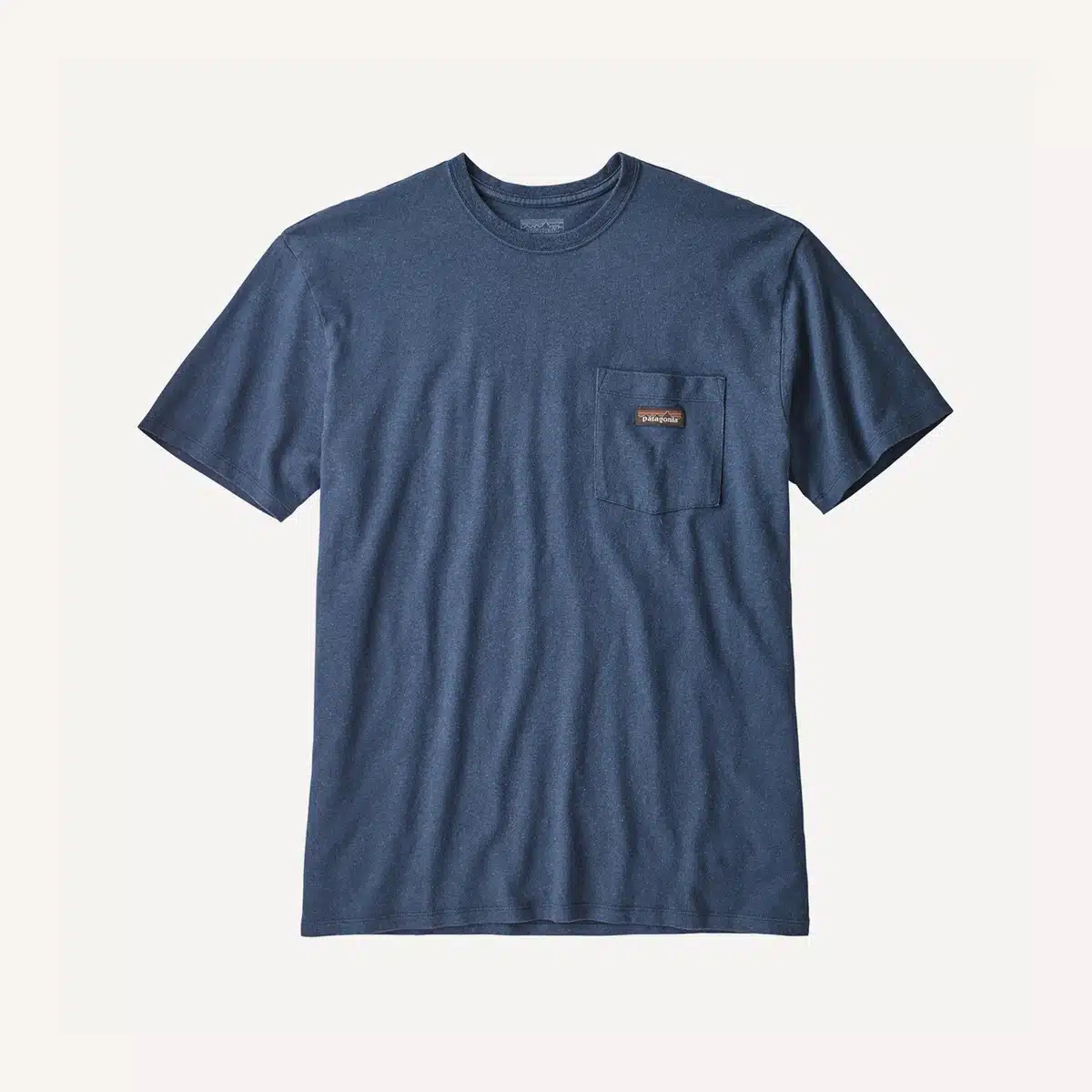
Patagonia provides The Footprint Chronicles at the bottom of each product page which lists details about the factory where that piece of clothing was manufactured.
Going one step beyond using sustainable materials such as 100% non-GMO organic natural fibers like cotton and linen, recycled polyester, and ethically sourced certified wools and down, Patagonia started working with bluesign® technologies in 2000 to ensure sustainability and reduce the number of chemicals, dyes, and finishes used in their fabrics.
Plus, they officially joined their network of bluesign® system partners in 2007.
Their inks are PVC-free and phthalate-free. Today, 72% of their product line uses recycled materials with that percentage increasing yearly.
A great example of Patagonia’s collection is the Responsibili-Tee®. It’s made from organic cotton, recycled cotton and recycled polyester. It features Hei-Q® Fresh odor control to reduce the need for continual washing.
Patagonia lives their mission by supporting local groups and supplying grants to individuals who are tackling the most pressing environmental issues:
“We aim to use the resources we have – our voice, our business and our community – to do something about our climate crisis.”
The company has a self-imposed Earth tax of 1% which provides support to environmental non-profits. They donate either $15 of every sale, or 10% of their pre-tax profits (whichever is more) to grassroots environmental initiatives.
Their Patagonia Action Works program helps you discover volunteering opportunities in your community and where you can donate to local causes. Not only do they act themselves, they openly encourage and empower their customers to become part of the solution.
Kotn
If you are interested in luxury cotton clothing, Kotn is a great choice. They use Gossypium barbadense, or extra long staple Giza cotton, known as “white gold”, that is grown only in the Nile Delta and within 100km of their factories in Alexandria.
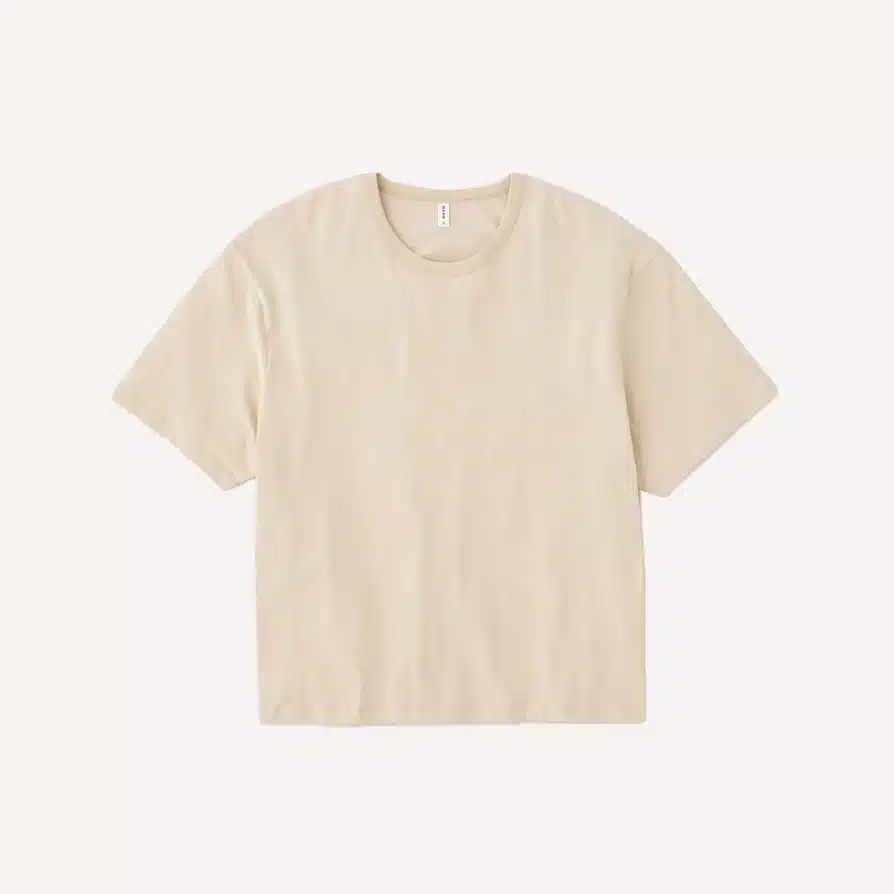
The cotton must be hand-picked to prevent stressing or damaging the long, fine strands. The result is a softer, more durable fabric with a higher thread count. Within the next 5 years all of their cotton will be certified organic.
Even though the cotton is of the highest quality, Kotn offers a complete line of affordable clothing. This is possible, in part, because they are a direct trade company; working directly with every step of their supply chain rather than having middle-men.
“Think of it like farm-to-table, but for your clothes.” Because they buy directly from family-run farms at set prices, they eliminate market fluctuations for the farmers, thereby guaranteeing them a fair profit.
Kotn is a Certified B Corporation who believes that traceability shouldn’t be a luxury, but the standard. They use third party auditors for both the farms they purchase from and their factories.
“As a Certified B Corporation every purchase directly supports the lives of our cotton farmers and their children, with your help, we’ve built 7 schools, funded 690 farms, and impacted over 30,000 lives in rural Egypt.”
The company donates a portion of each sale to build and fund these schools, pay for books and train teachers to educate the children from the cotton farming communities, especially girls who traditionally have fewer educational opportunities.
They work with a local Egyptian NGO to stop the cycle of child labor.
Asket
Asket is a Swedish company that wants to restore the value of clothes and re-evaluate the materials we use. The name literally means “a person who does without extravagance and abundance”. In practice, that means that they introduce key pieces one at a time.
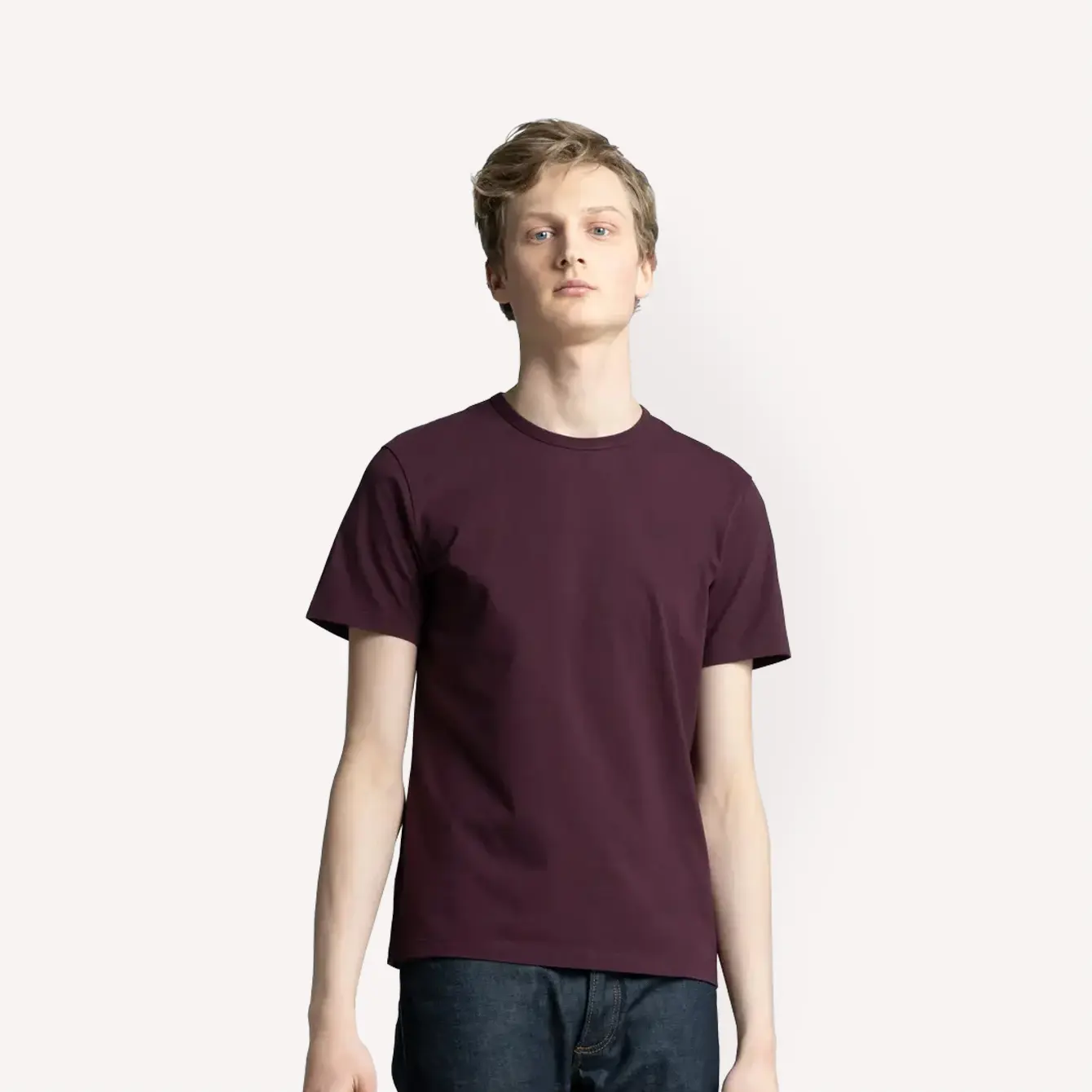
They don’t have seasonal collections, but a permanent collection (currently at 20 garments), that encompasses everything you need. “We can’t live without clothing, but we can make the pieces we choose to invest in count.” Asket is the polar opposite of the fast fashion trend.
“Garments…have lost their value. We buy more and use less than ever – packing our wardrobes, filling landfills and fueling incinerators. All at the expense of our society and planet.
Asket exists to end this.…We envision a world free of fast consumption. A world with less clutter, less waste, less smoke and mirrors.”
Since each piece of clothing should count, Asket uses the finest natural materials: merino wool from Australia, Egyptian cotton, organic cotton, linen and cashmere. (They rely on nomadic farmers in Mongolia).
They use recycled materials for their linings and zippers. They also offer extended sizing choices so that your clothing will fit properly and provide detailed care instructions so they will last.
While not all of their fabrications are completely sustainable, they are very focused on traceability.
Each page of their website has a “Traceability bar” that shows where the garment was milled and manufactured, and where the raw materials and trims were sourced, for a total traceable percentage.
This philosophy extends to the true cost of their products. They list the cost of the fabric, hardware, labor, and transport, as well as the traditional retail price. Their ultimate goal is 100% traceability – they are currently at 81% (ranging from 50% – 100%).
Nau
High performance clothing can be sustainable. Nau is one of the first companies to prove that. They are innovators and inventors of fabrications that are high-performance, rugged, yet comfortable and totally sustainable. Their 4 core values are:
- If it doesn’t exist, invent it. As the first sustainable performance wear brand, the fabrics and processes we needed largely didn’t exist. So we had to create them. To make the world more sustainable, we’re ready to do the heavy lifting.
- Refuse to compromise. We have refined our list of permissible fabrics to 10 sustainable textiles.
- Make clothing that lasts. Sustainable design in a timeless style makes it sustainably designed.
- Do More. By giving back.”
Their clothing is based on timeless basics that are as at home inside, in urban settings, as they are in the out-of-doors. They are made to hold up to tough environments. Their 10 fabrications help ensure this.
They use: RWS certified merino and alpaca wool, recycled wool, GRS recycled polyester, closed loop micro-modal Tencel™, Lyocell™, linen, hemp, GOTS-certified organic cotton and recycled down (sourced from old duvets and pillows) to make everything from tee-shirts to insulated outerwear.
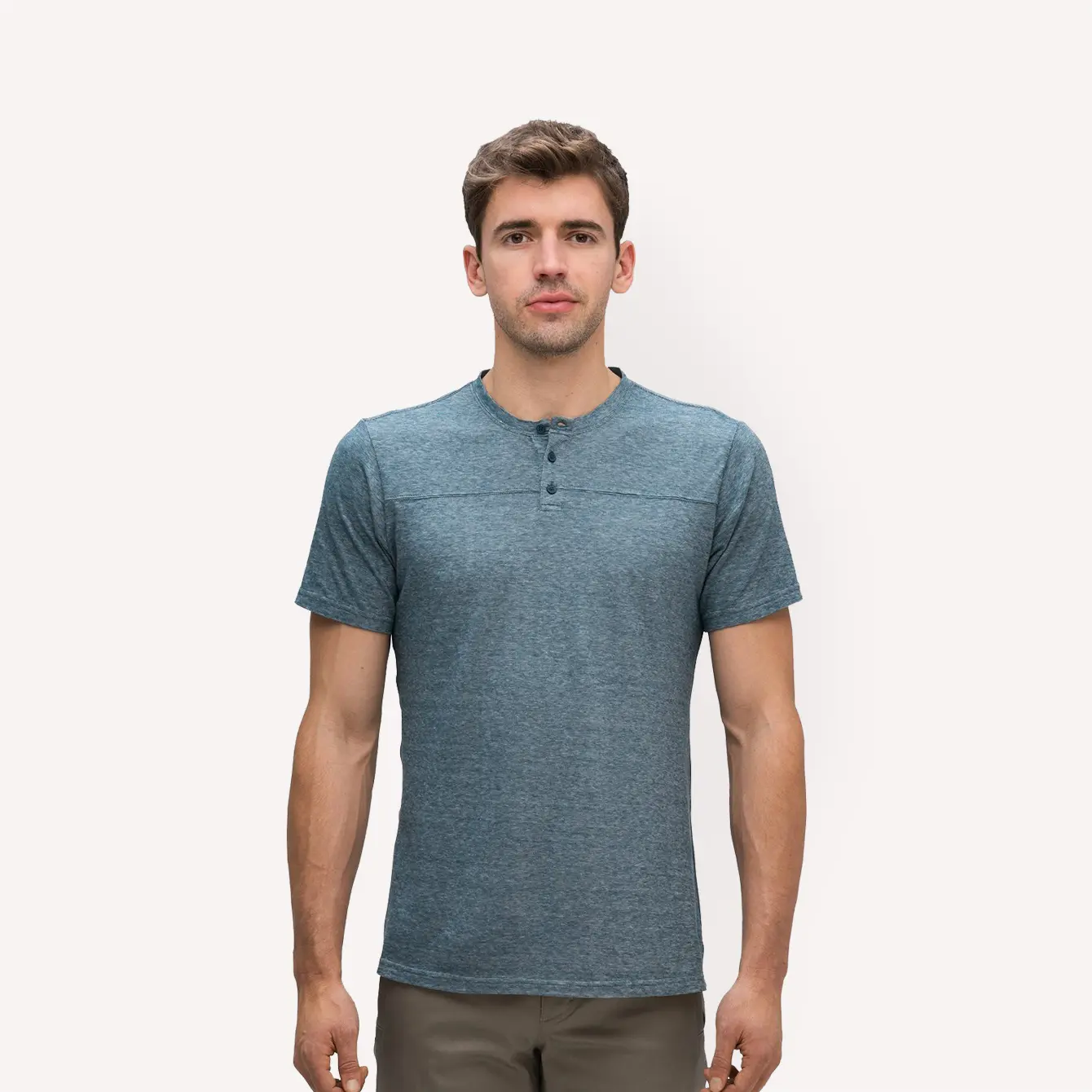
Many of their fabrics are FSC certified and bluesign approved. This makes them a great choice for people with skin sensitivities. For instance, their waterproofed outerwear utilizes PFC-free DWR (durable water repellent) coating or natural waxed cotton canvas.
PFCs can affect the health of the wearer and the environment. For this reason they are on the “Restricted Substances” list.
To guarantee quality control, Nau maintains long-term relationships with manufacturers “whose practices and integrity we know and trust”. They use factories in Asia because they have the technical expertise needed to create their sustainable fabrics.
By keeping fabric mills and manufacturing in close physical proximity, they reduce transportation costs and emissions.
Nau’s 4th Core Value is “Do More by Giving Back”. They do this by donating 2% of their income to grassroots environmentalism. The remaining 98% goes toward building a more sustainable company “so every purchase you make at Nau supports sustainability. On every level.”
Currently, Nau is supporting the Conservation Alliance, which brings businesses together to help fund and protect wild places, and Mercy Corps – a global humanitarian organization that empowers people to recover from crisis, build better lives, and transform their communities for good.
prAna by Columbia
prAna was acquired by Columbia Clothing in 2014. In addition to casual pieces, they specialize in outdoor items specifically for swimming, surfing, rock climbing and yoga. They focus on sustainability and creating innovative clothing that supports a sustainable lifestyle.
They are a Fair Trade company, members of the Textile Exchange, a bluesign partner, and member of the Fair Labor Association. Their fabric choices include: organic cotton, recycled polyester, hemp, Tencel™ modal, sustainably harvested merino wool and RDS certified down.
They trace their source material from the farm through processing and production, all the way to the end product.
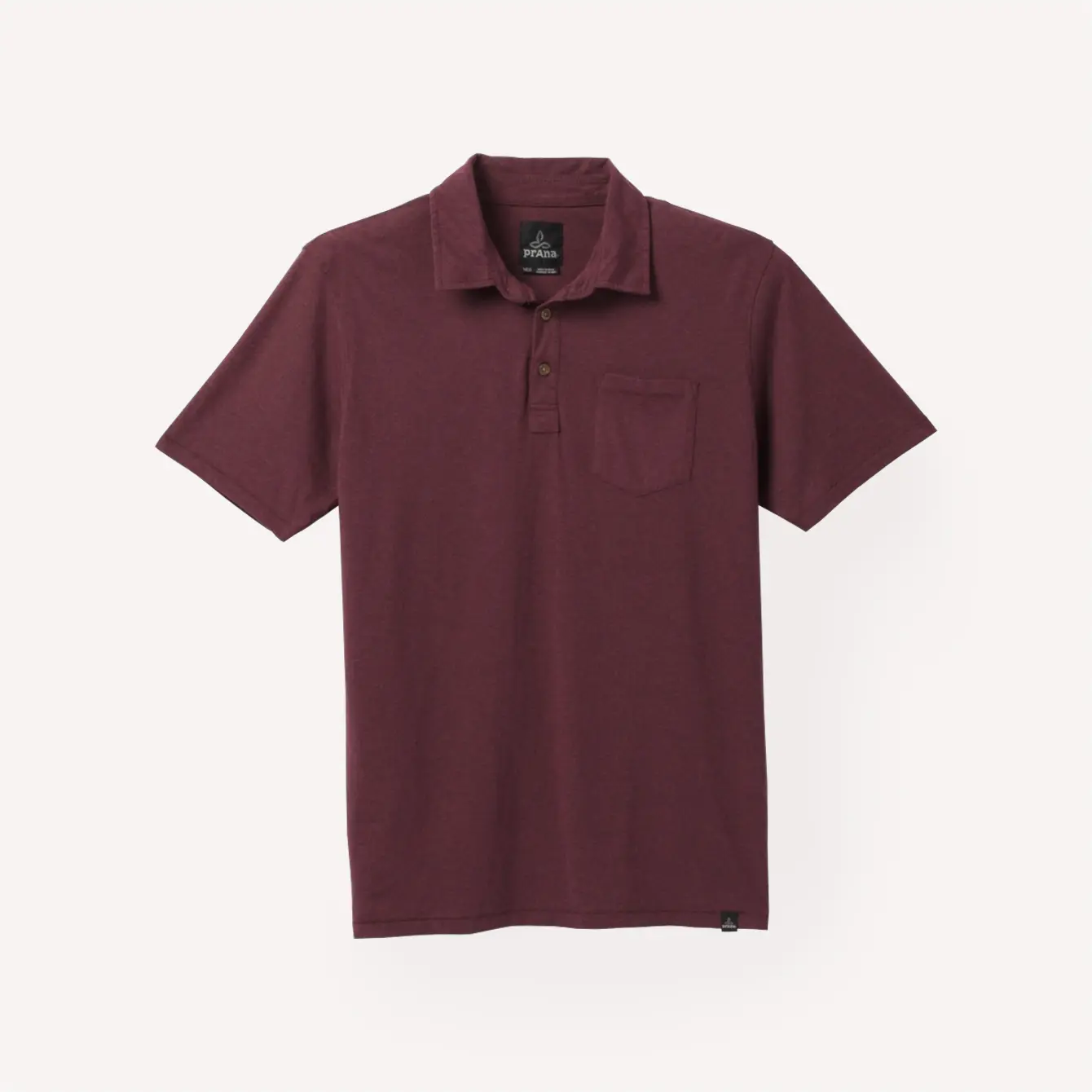
prAna’s partnership with bluesign means that their production methods produce the least amount of toxic chemicals possible, resulting in a less dangerous work environment for factory employees, safer clothing for the wearer’s skin, and protects the earth during production and after as a compostable.
prAna’s philosophy of inclusivity, social responsibility and continual improvement, can be seen in their clothes:
“Together, we can outfit our adventures with respect for the planet and its people; We can inspire new generations to thrive and stay active in their own unique way; We can create clothing for positive change.
We believe positive change comes from progress, not the pursuit of perfection. From the farm to the factory to our closets, we all have an opportunity to create positive change through clothing.
Start asking questions about your clothes in the same way you ask about the food you eat, and you can help fundamentally change the way clothing is made.”
They support charitable organizations such as Outdoor Outreach programs for at-risk urban youth and surfing camps for girls.
Tentree
Tentree really is about trees. For every product purchased, they will plant 10 trees. “We motivate and encourage environmental stewardship through earth-first apparel.” Tentree is one of the most environmentally progressive clothing brands available.
This is not to say that they are only about trees. They aspire to create affordable clothing that is not only sustainable, but accessible through inclusivity of all body types, comfortable and high quality.
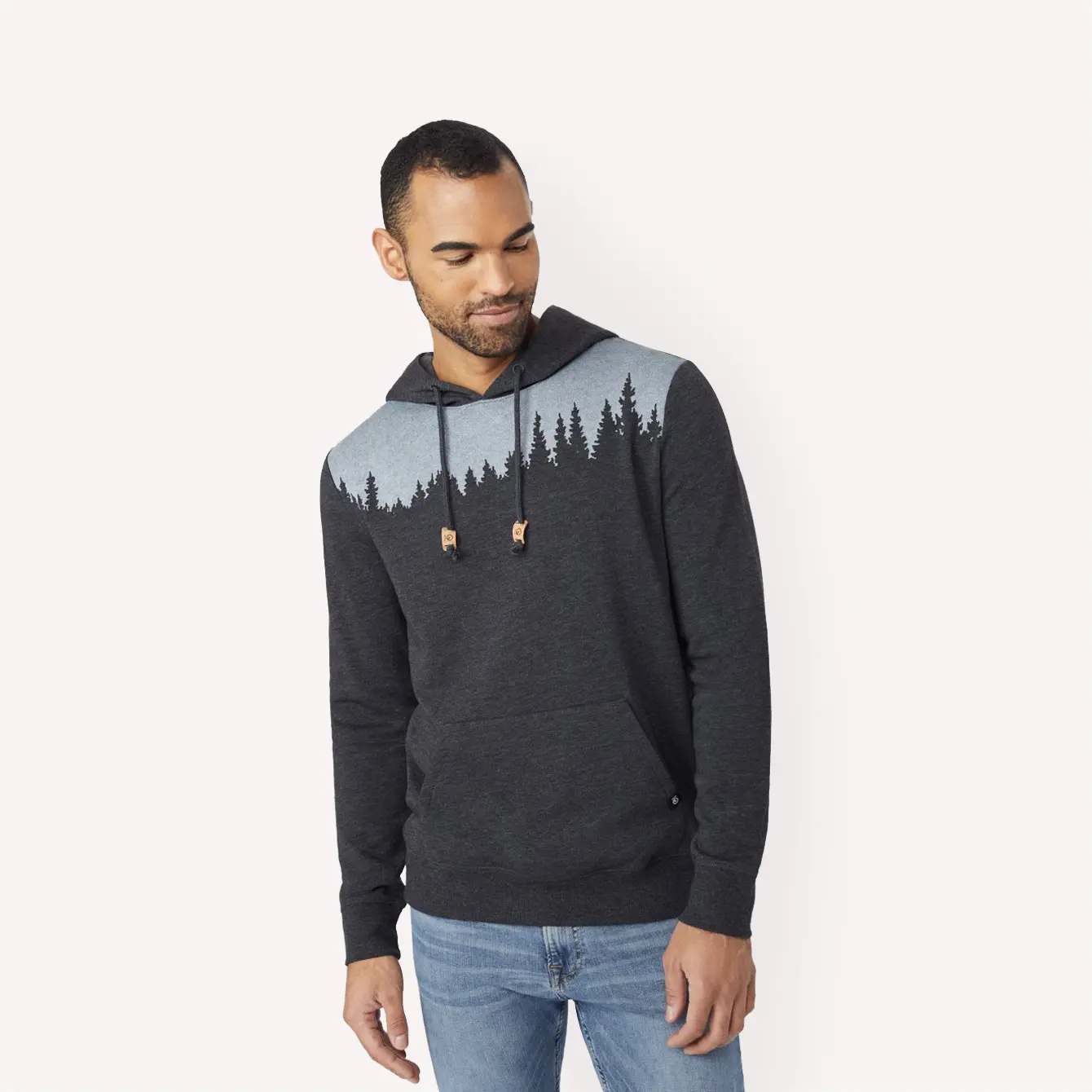
They offer a complete line of casual clothing made from hemp, cork, organic cotton, Tencel™ and RePREVE™ recycled polyester. Their outdoor wear is durable, and many items feature great graphics of trees or animals that reflect their passion and commitment.
Tentree has earned numerous sustainable and ethical certifications. All their factories bear one or more certifications such as: Fair Trade, Fair Wear Foundation, WRAP, BSCI and SA8000.
It’s a B Corporation that scored in the top 1% of all manufacturing. They are completely transparent about where their clothing is manufactured and all their suppliers and partners must sign their Code of Conduct.
This “ensures that all the people who work with Tentree are respected, valued, and feel safe.”
Transparency is displayed for each item through an Eco Log which compares wear, CO2 emissions, and waste saved between their product and comparable products. Before any garment goes into production, Tentree has an independent impact assessment prepared by third party, GreenStep.
“We believe in the power of small acts, so by empowering everyone and anyone with easy access to sustainable solutions those tiny seeds of change can grow to change the world. #ItTakesAForest”
Tentree takes saving the world through reforestation very seriously. They want to counter climate change on a global scale. The first thing you see on their site is how many trees have been planted…and that number increases as you watch.
As of August, 2020 more than 43,800,000 trees have been planted in Madagascar, Indonesia, Senegal, Nepal, Canada, Mexico, Peru or Haiti. Their goal is to reach 1 billion trees by 2030.
They are thoughtful about where and what they plant. They choose areas with damaged biodiversity or that require land restoration.
They won’t plant invasive species; their goal is “the rapid and continued return of indigenous diversity to these lands” so they chose fast growing, multi-purpose trees.
Many of these forests not only help the environment, but provide local jobs.
Consumers are encouraged to participate with Tentree by registering their trees. They will provide proof, if contacted, through geotagging photos and GPS coordinates, of the trees that your purchase made possible.
You can read our hands-on review of Tentree here.
Outerknown
Outerknown clothing has a definite surfer vibe. This isn’t surprising since the company was co-founded by world champion surfer, Kelly Slater.
“At Outerknown, sustainability is not a marketing slogan or something we take lightly. Sustainability is literally who we are.
Sustainability is why the company exists….I didn’t see a single apparel company that was truly living up to the responsible standards that I believed were possible. So, I had to start one.”
A full range of casual clothes, including selvedge jeans, plus swimwear, is offered in eco-friendly and sustainable fabrics such as organic cotton, hemp, alpaca, wool, RDS-certified down and a variety of recycled materials including fishing nets, hemp and Econyl® for their swimwear.
Even their buttons, made from either recycled polyester or natural corozo nuts, are sustainable.
Outerknown’s “blanket shirts” are a versatile flannel that, like the line in general, is rugged in build and soft to the touch.
Outerknown has high ethical and sustainable manufacturing standards. Items marked S.E.A. (Social and Environmental Accountability) have to surpass their strictest standards.
They are a Bluesign certified brand so all garments are processed with minimal chemicals.
They believe that “sustainability starts with transparency” so they publish a full list of their suppliers, who are required to abide by their Code of Conduct and Fair Labor Association (FLA) standards.
At Outerknown, “sustainability is the destination, Outerknown is the journey.”
Kuyichi
Kuyichi is a Peruvian company that was one of the world’s first organic denim brands. The founders, shocked by the pollution and poverty they found in 2000, started collaborating with local farmers.
When they couldn’t find a buyer for their organic fabric, they decided to start their own brand.
Innovations in denim production have allowed Kuyichi to save millions of gallons of water and reduce power usage by using laser washing techniques. This also increases fabric strength by 50% and workplace efficiency by 500%.
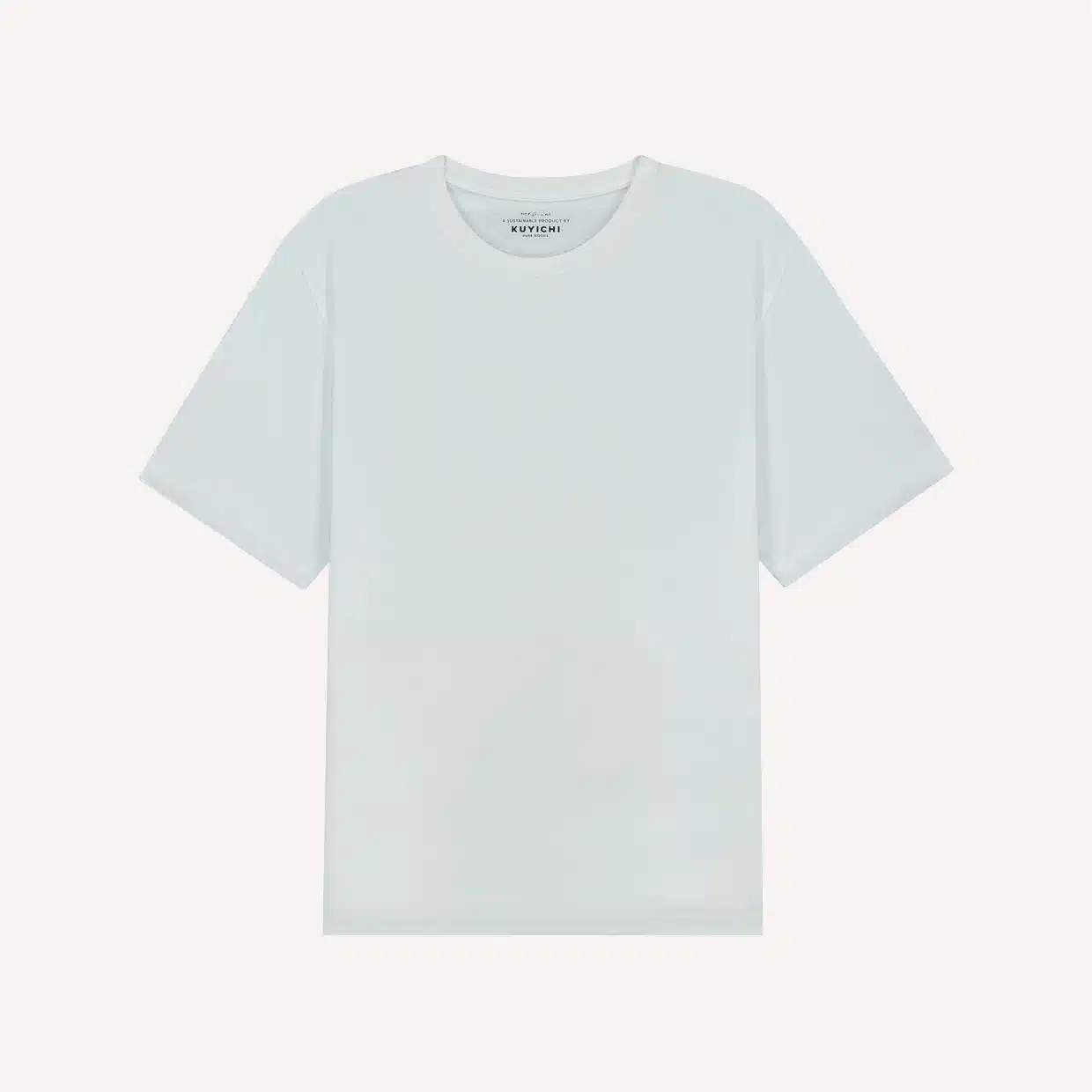
They use chemical free ozone bleaching and natural indigo dyes (instead of toxic azo dyes). Their jeans are never stone washed, or subjected to abrasive blasting so there is no hazardous dust. They have expanded their product line to include all types of tops, as well as chinos.
Their clothing is made from GOTS organic cotton, recycled PET, Tencel™, hemp or linen.
“A beautiful pair of jeans only increases in value and starts telling a story the longer you wear it. That’s why we have let go of the seasonal collections and focus on timeless essentials.
Furthermore, we’ve decided to stop practicing sale. We believe the products’ value doesn’t change over time and that the products should always have a fair price for the consumer, the retailers and the people who make our clothes.”
In deference to the environment, they follow the Global Fashion Agenda’s commitment to use more Post-Consumer Recycled Denim, and their suppliers commit to a Transparency pledge.
All suppliers are listed on their website and have agreed to follow the Fair Wear Foundation’s standards and the UN Universal Declaration of Human Rights.
“We also think that recycling is a big part of the solution as well. That’s why we work with different partners to make beautiful new things out of old denim. A part of our denim fabrics consists of Post Consumer Recycled Denim (made from old collected jeans).”
Kuyichi encourages their customers to donate their used jeans. They have partnered with Blueloop recycling sites to transform these used jeans into new jeans.
Their focus on continual value and timeless classics have allowed them to move away from fast fashion and the industry trap of deeply discounting their product to make room for the next season’s offerings.
KnowledgeCotton Apparel
KnowledgeCotton focuses on classic garments with a contemporary twist. They offer a full line of choices that all reflect the 3 elements of their philosophy: gain knowledge, take action, earn respect.
“Respect is something you earn. But it’s also something you pay others. Your surroundings and the environment. We believe that it’s important to pay respect to those around us. We are paying respect to the planet and its citizens and use resources in the best conditions possible.”
The company’s goal is to be as sustainable as possible in their water, energy and carbon dioxide use. They list the savings compared to a traditionally made garment for each item. They use organic cotton and linen, Tencel™, GRS certified recycled polyester and organic ZQ merino wool.
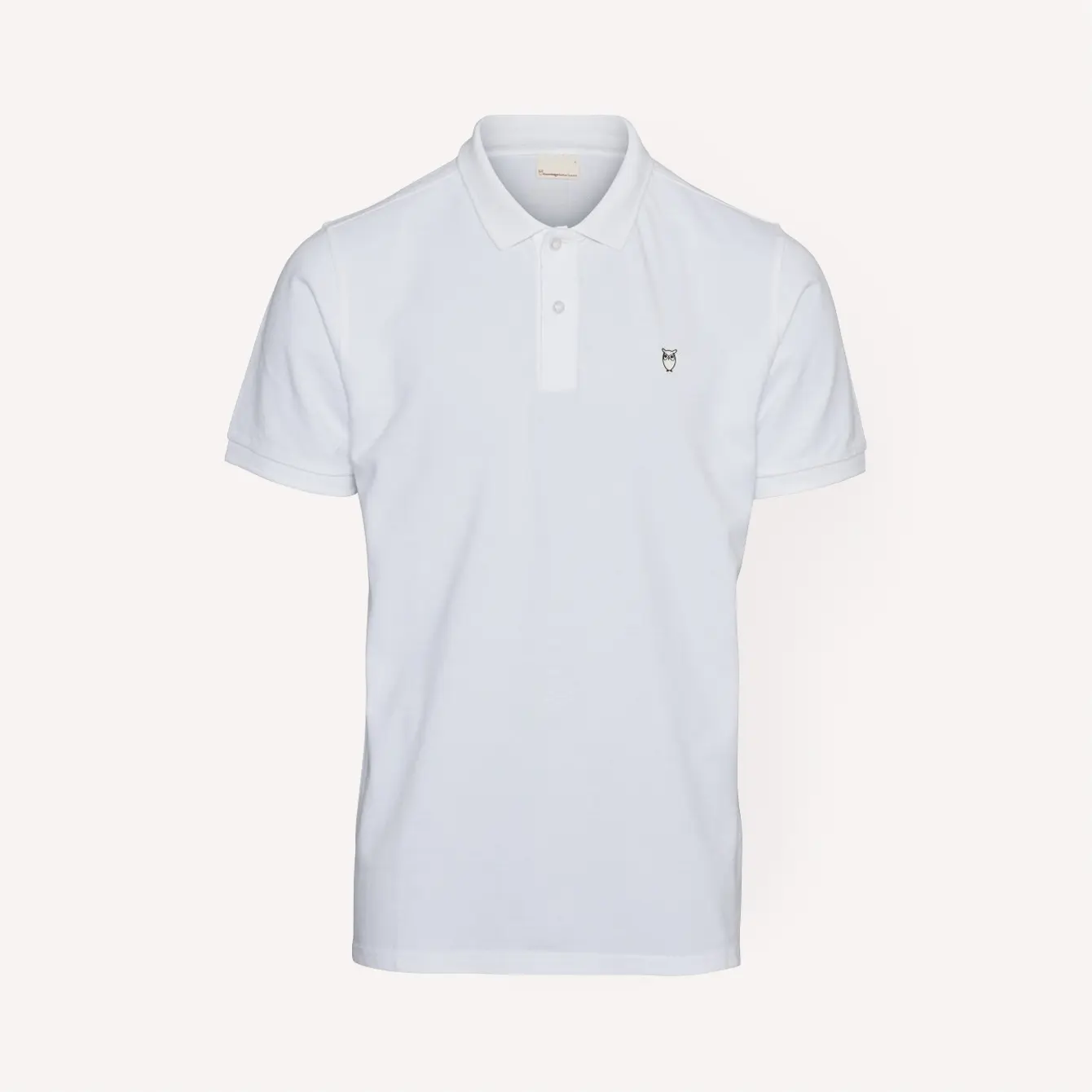
In addition to using sustainable fabrics, KnowledgeCotton focuses on sustainable production methods. They have been certified Carbon Neutral® and their goal is to be 100% carbon neutral by 2025. A part of this plan is their planting of the Knowledge Forest in India.
“Already as a youngster I learned that a business without a purpose to do good, will never be a successful business. That the difference between good and bad business has nothing to do with profits.
I learned that quality takes time and that it is reflected in the product. And, I realized that with a thirst for knowledge and a desire to constantly develop and improve at what we do, we can actually make a difference.”
The company is certified by Ecocert Greenlife, GRS (Global Recycle Standard), OCS (Organic Content Standard), SA8000 and Fair Trade. In addition to their sustainability, KnowledgeCotton fights against poverty and child labor.
Everlane
The above phrases are what drive Everlane to make a difference. They take a streamlined, quality-driven approach to produce elegant, modern clothes that offer refined basics for business-casual and every-day needs. They sell a bit of everything for men and women, including shoes and accessories.
“At Everlane, we are working to do our part by building an ethical supply chain that creates high-quality, low-impact, long-lasting products.
We carefully consider our materials and work with our production partners to reduce waste, chemicals, and plastics that endanger our planet’s ecosystems. Our timeless basics are designed to last—so making the right choice by the planet can be as simple as putting on a T-shirt.”
Transparency is so important to Everlane that their website features the “true cost” of all their products. They break down the actual cost of materials, labor, transport, duties and hardware (buttons, etc.) and then compare their cost with the competition’s traditional retail cost.
They also have an interactive map that pinpoints where their fabrics are sourced and their factories are located.
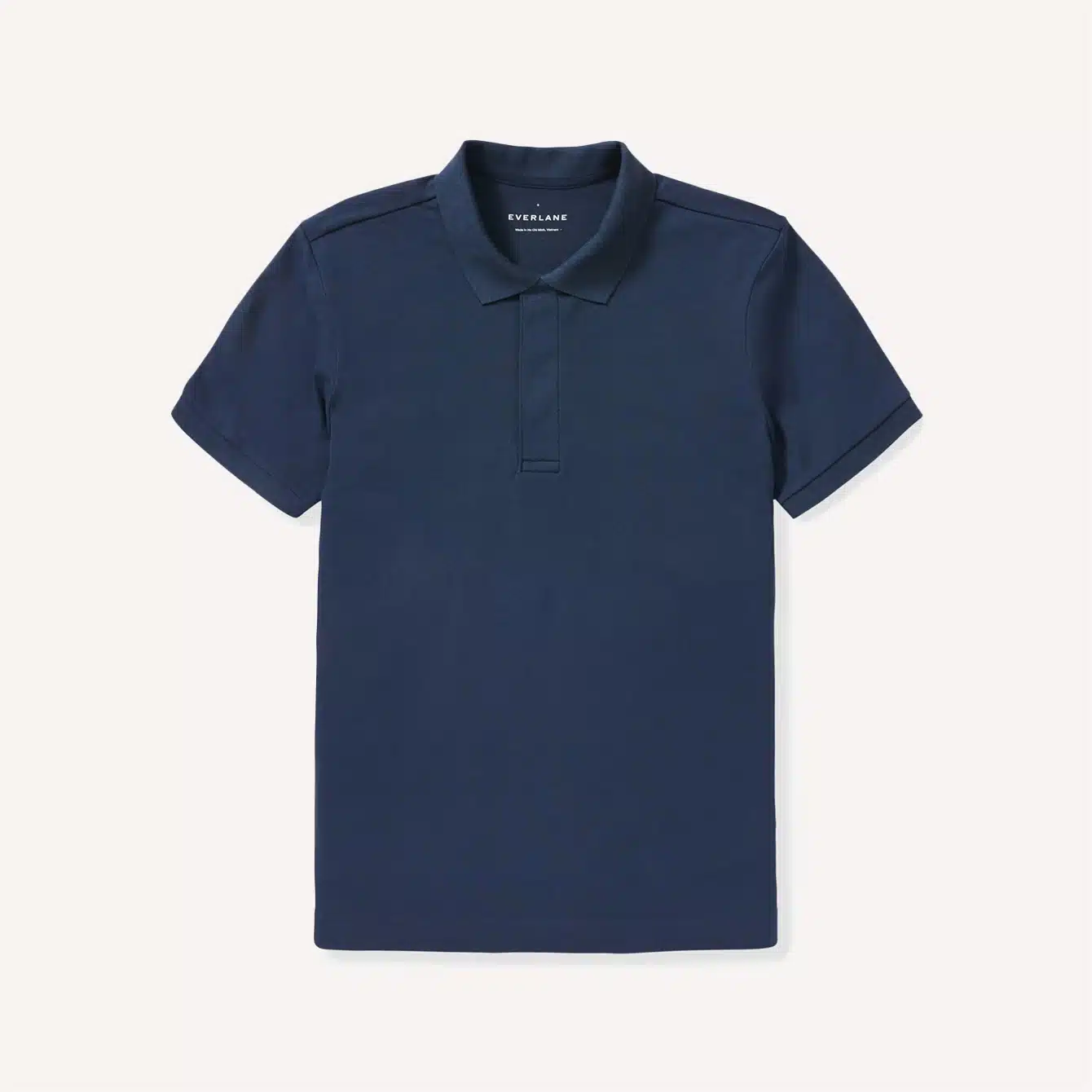
Everlane is particular about their manufacturing processes. They audit their factories yearly in compliance with the California Supply Chain Transparency Act.
They limit their materials to 100% linen or cotton, and recycled materials. For instance, their reversible puffer jacket is made with a 100% recycled polyester shell and filled with 100% recycled down.
Their commitment to reducing waste extends to their ReNew™ line of products that eliminated all virgin plastic use by 2021. They have similar programs, ReWool™ and ReCashmere™, where yarns are recycled and combined with new yarns.
Not only is Everlane committed to quality products, made sustainably, and consumer transparency, they have committed themselves to donate to a different charitable fund every Black Friday such as Oceana and Surfrider Foundation.
One final note about Everlane: there is some press that isn’t completely positive about the quality of their clothing, corporate inclusivity and diversity, and their sustainability. These issues are comprehensively discussed in a NY Times article.
You can read our review of Everlane here.
Pact
Pact wants to make organic affordable (tee-shirts for $25 – $35). They offer a full line of clothing, underwear and household items made from GOTS certified cotton in a wide range of sizing from S-XL, with some larger options available.
They produce classic pieces for a timeless look that are easily paired with your existing wardrobe.
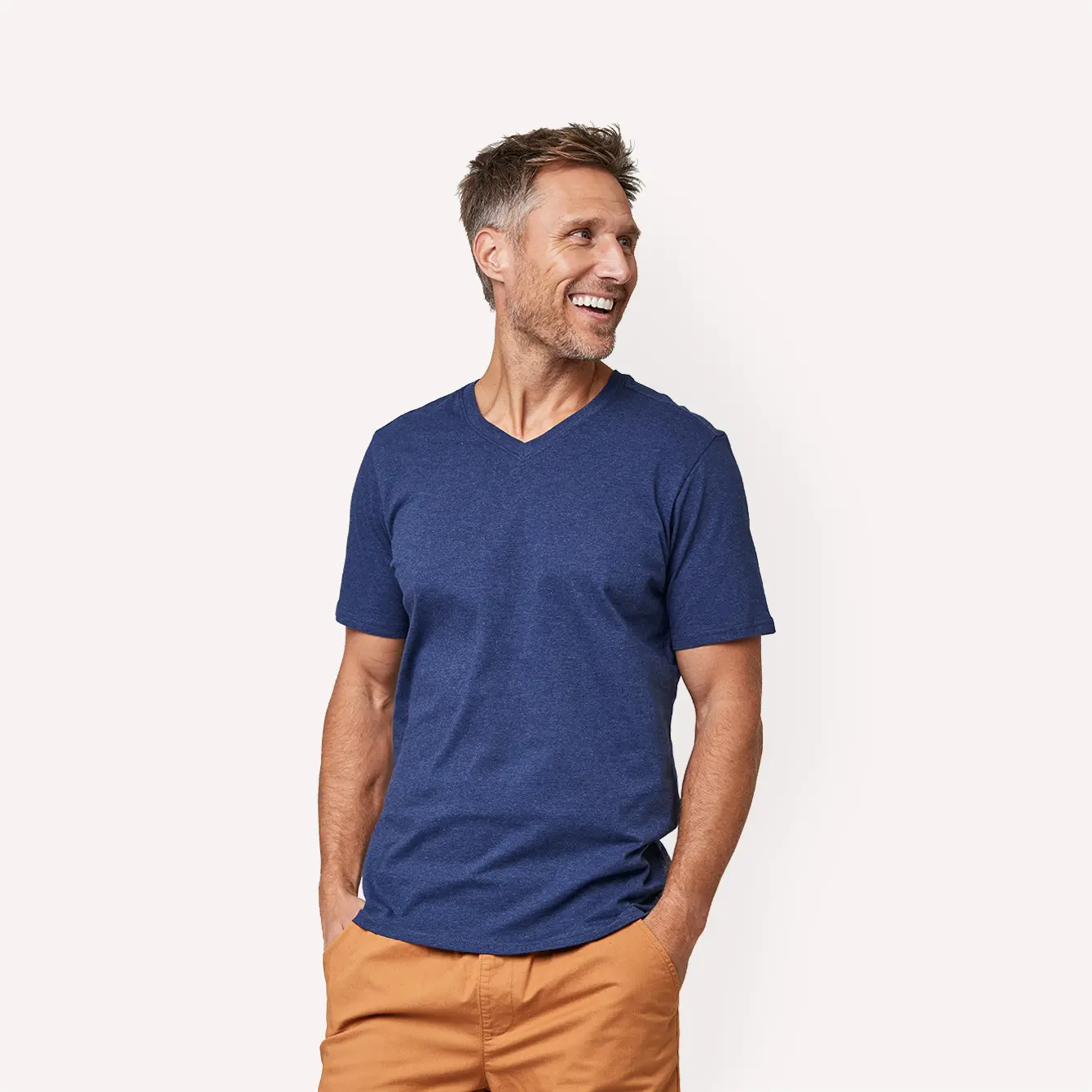
Pact uses Fair Trade USA Certified factories. 74% of their garments are organic cotton sourced in India, where they also manufacture, to be more economical and environmentally friendly.
They make sure that the factories they use are sweatshop and child labor free. Sustainability practices also include using zero harmful chemicals, reducing water and energy usage in production, and shipping in recycled and compostable packaging.
Pact gives back to the community through their clothing donation program – Give Back. Wear Forward. They encourage people to ship their clothing (any brand) back to Pact where they will deliver them to inspiring nonprofits in need.
You can read our review of Pact here.
Naadam
Naadam provides luxury cashmere that is sustainably harvested and produced. Even though they pay nomadic goat herders 50% more than average, their products are surprisingly affordable because they have eliminated the traders and brokers who drive up the price.
A cashmere sweater, starting at $75, is available in over a dozen colors and in sizes from XXS-XXL. Some of their clothing lines combine cotton and cashmere, and they offer a full line of choices from outerwear to pajamas.
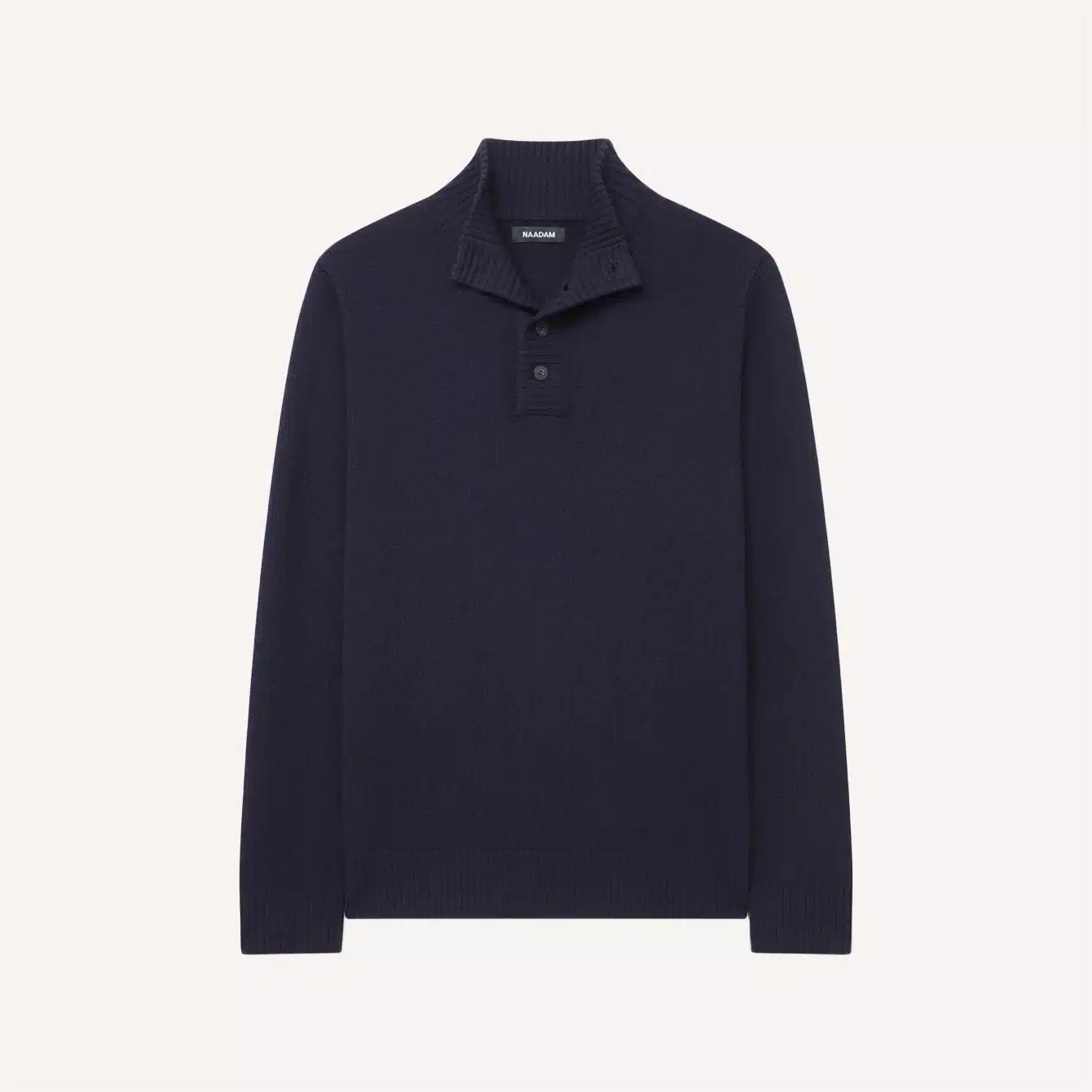
Naadam sources their cashmere in Mongolia’s Gobi Desert and they insist that the goat hair is hand-combed, rather than sheared.
They even provide veterinary care to ensure that the animals live in ethical conditions taking a “cradle-to-cradle” transparency approach; this means they are interested in how the garment is produced and what will happen to it once it is no longer wanted.
They also support the Gobi Revival Fund, a non-profit organization that has set up a clean water source, livestock insurance program, and built a park.
To increase environmental sustainability and prevent desertification, they have fenced off a large area of grasslands.
All their packaging is made from 100% pre-consumer Forest Stewardship Council-certified recycled paper and 100% recycled plastic made with non-toxic chemicals that will biodegrade faster. Their goal is to be carbon neutral by 2025.
Groceries Apparel
Groceries Apparel sources their products from the seed, to the farm, to their factory. They use only 100% GMO, pesticide- and herbicide-free, recycled and Fair Trade products.
Their definition of transparency and human responsibility include supporting family farms, localized manufacturing, providing living wages, and using Monsanto-free, post-consumer ingredients.
They insist on fair-trade, fair conditions and fair treatment throughout their entire supply chain so everything is traceable.
Groceries Apparel’s selection for men is limited to tee-shirts, with the occasional hoodie or sweatshirt. They start at $38 and are offered in XS-XL, with slim, classic, relaxed and oversized fits.
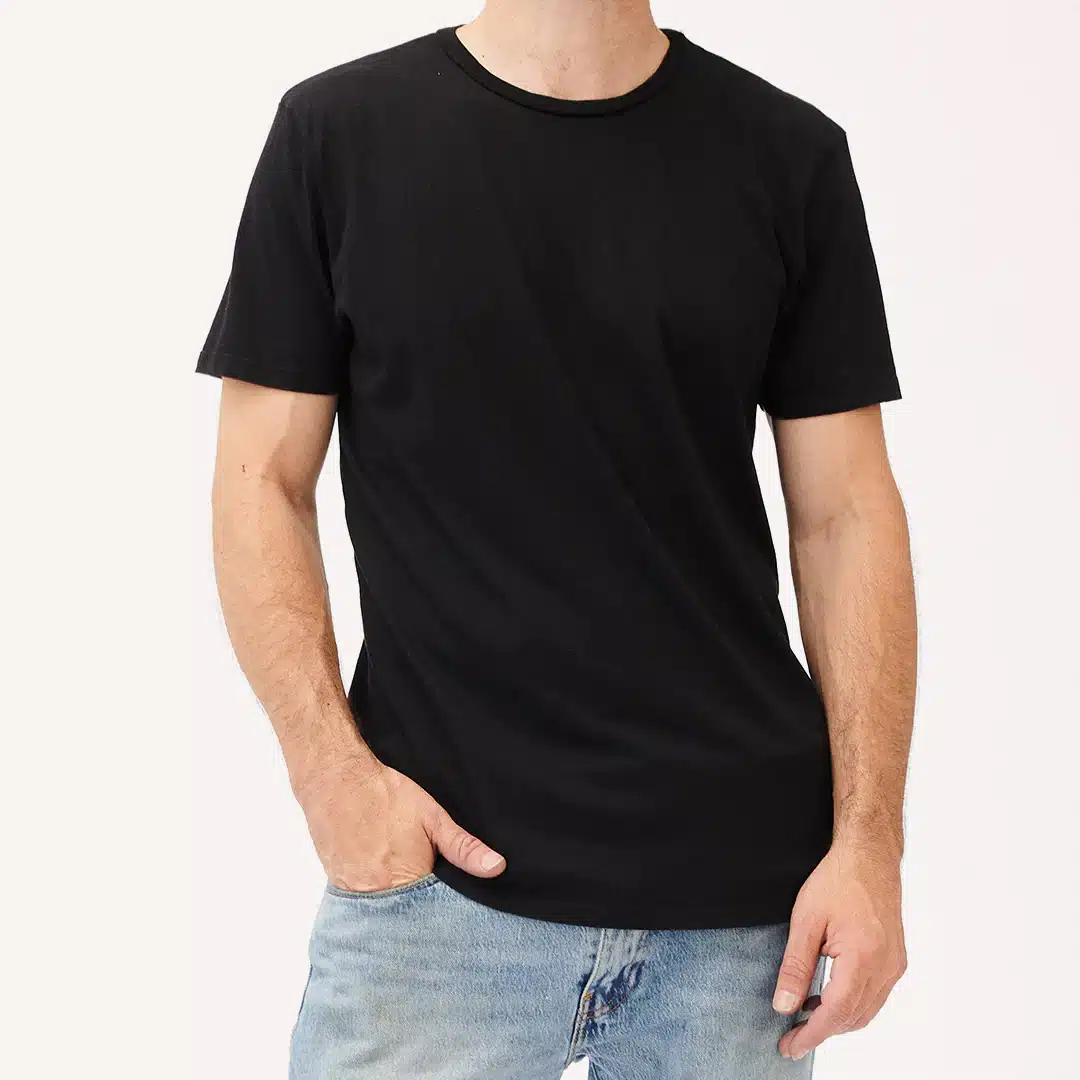
They use non-GMO organic cotton, eucalyptus, recycled plastic, hemp and recycled cotton with vegetable dyes made from herbs and raw plants.
You can actually shop for your product by ingredient on their website. 98% of their vendors are in the Los Angeles area, keeping source materials close to their factory.
While the selection is very limited, their commitment to pure fabric, free of chemicals, is a great match for those who have skin sensitivities.
Passion Lilie
Passion Lilie is another brand that has a very limited men’s selection. They offer button shirts in S-XXL starting at $56.
What makes them unique, and worth exploring, is that their fabrics are made from 100% organic and non-GMO cotton, and hand block printed with eco dyes using ancient IKAT dying methods.
Each wood block is hand carved by a master craftsman. Their hand-woven fabrics are pre-washed in the river and sun dried, dyed a base color, then the wood block is dipped in another dye and hand stamped.
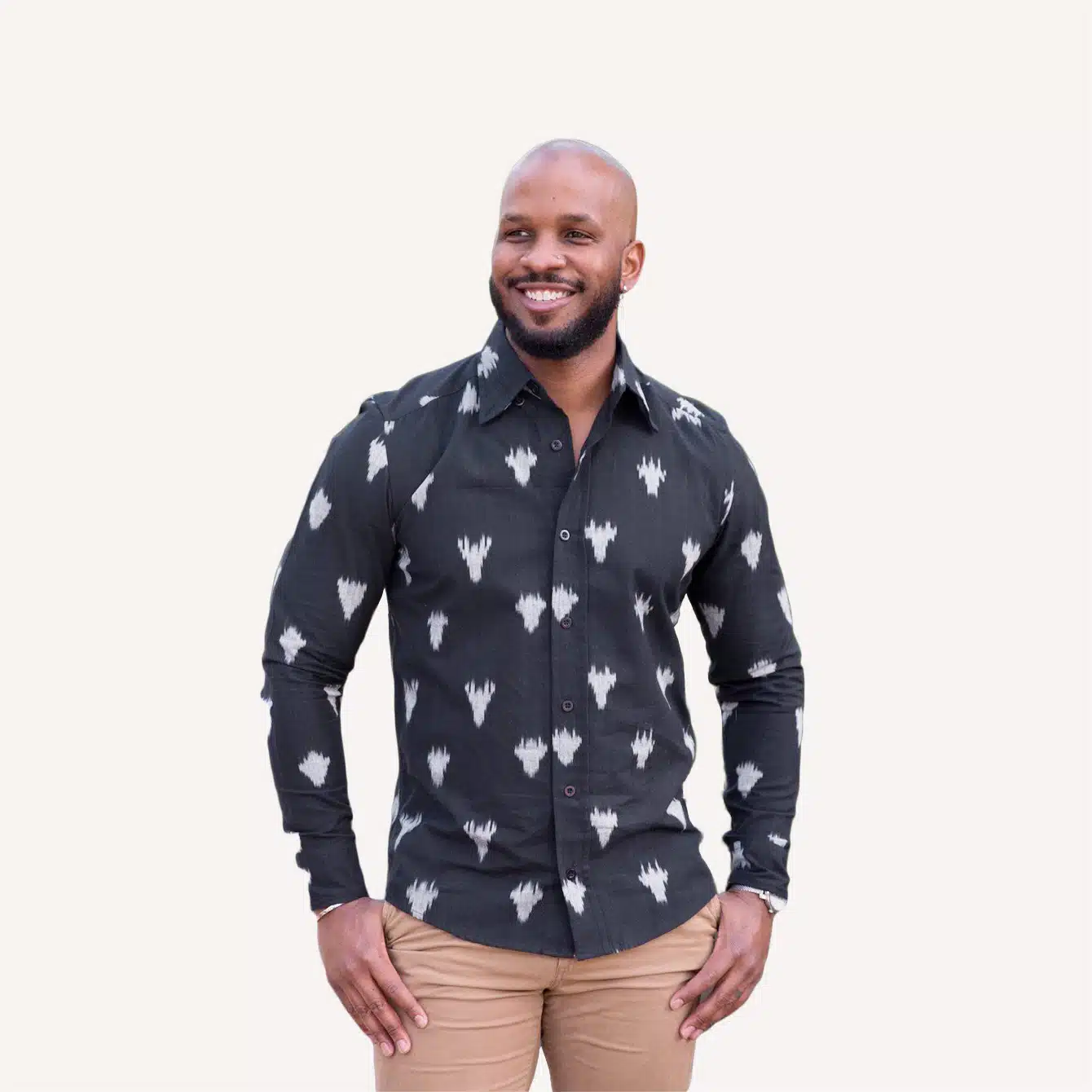
The entire process is non-mechanized, but supports family factories in India.
Passion Lilie is a member of the Fair Trade Federation, a Green America Certified Business, and a Ethical Fashion Forum Fellowship 500 Member. They provide disadvantaged community members with health care, fair wages and loan opportunities.
The company believes in helping charities that their customers are passionate about.
Todd Shelton
Todd Shelton is unique among sustainable and ethical clothing companies – they offer made-to-order clothing: tee-shirts, shirts, sweatshirts, jeans, and pants. If you are ordering a tee-shirt (priced from $85), you can choose one of their 9 sizes or have a fit consultation with them.
Their jeans are priced from $275. You can customize your size: waist measurements from 28-40” in 1 inch increments, inseams from 28-36” in 1 inch increments, and thigh pattern options of lean, basic or relaxed fit.
They offer raw and selvedge jeans in addition to some softer, lighter colored versions.
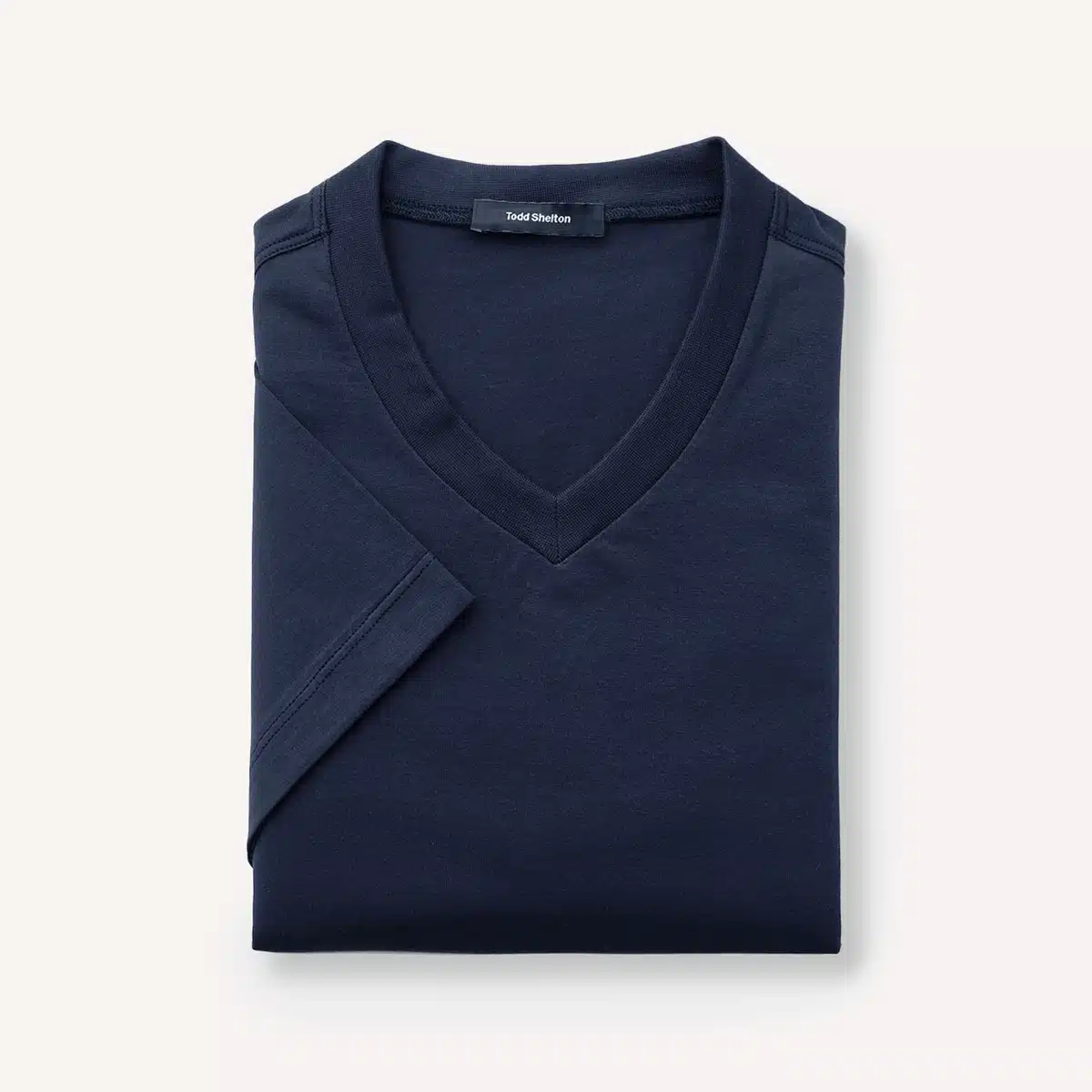
By creating a made-to-order company, Todd Shelton offers better fitting garments designed in timeless silhouettes with longevity and high-frequency wear in mind.
They believe that jeans are part of a business casual wardrobe. The advantage of manufacturing only what is sold is that it reduces waste. Their clothing is sewn in New Jersey and almost all of their materials are natural and biodegradable.
They have eliminated plastics from their shipping and avoid using animal products (leather patches and horn buttons).
Finally, as part of their timeless collection, Todd Shelton avoids marketing practices that lead to “unhealthy consumer behavior. Frequent product drops, inflate-and-slash pricing, and using words like ‘Last Chance’, can exploit consumer behavior.
We strive to educate our customer on responsible consumerism.”
Ably
Ably offers a full line of clothing including undergarments and accessories protected by Filium, a fiber coating that offers many unique and eco-friendly qualities without sacrificing the fabric’s natural softness or breathability.
It can be used on cotton, wool, silk or other natural fabrics. This core technology is produced according to bluesign standards for sustainable materials and production.
Much of Ably’s clothing is cotton and their sizing is more extensive than many, with shirts raging from S-XXXL ($48), and pants ranging from 28-40” for around $100.
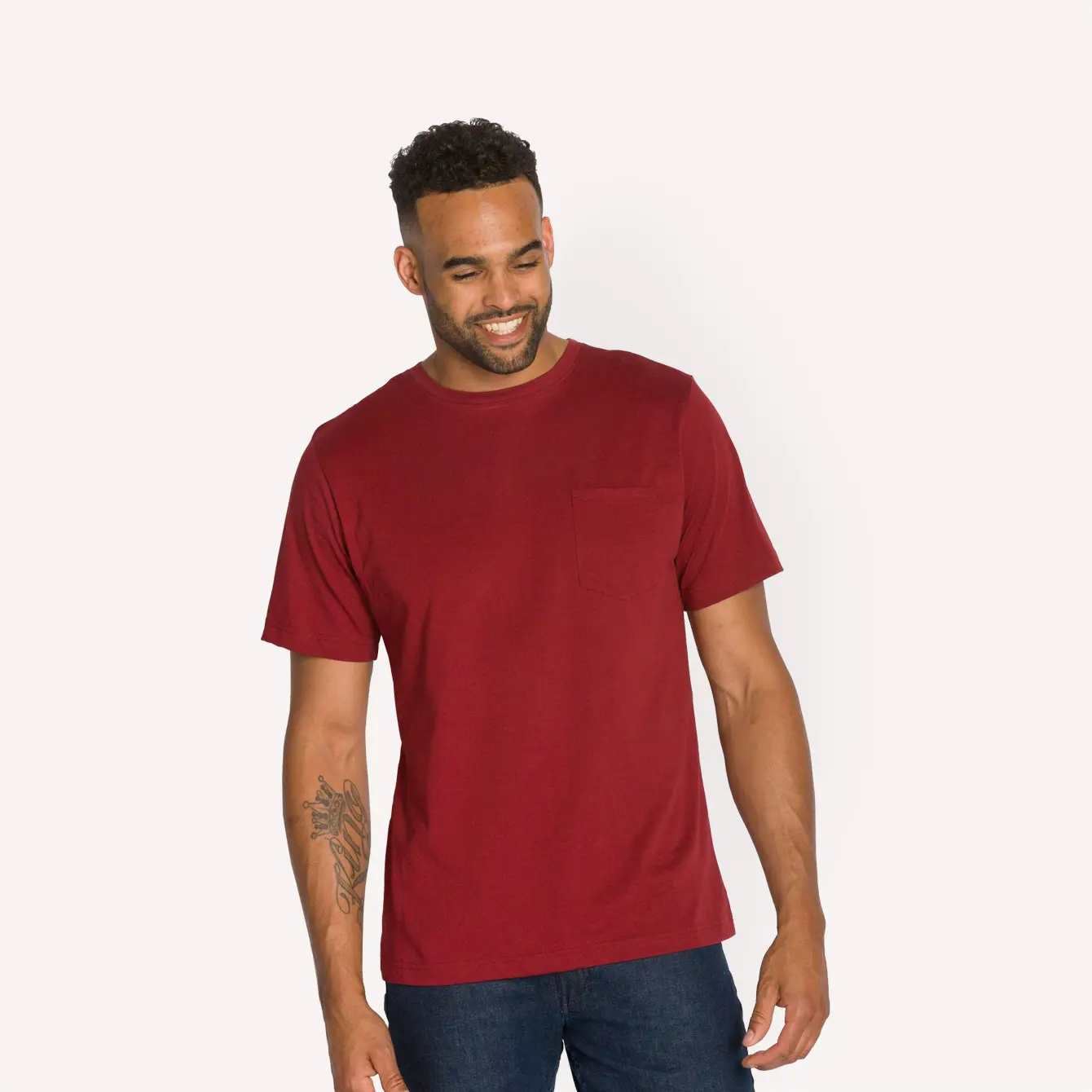
Filium allows perspiration to evaporate through breathable fabric so your garments stay odor-free. They are also stain resistant.
Between these two qualities, your clothing needs to be washed much less frequently and even when you do, clothing that is Filium-treated dries 40% faster than uncoated clothing.
Ably’s website allows you to calculate how many gallons of water per month you will be saving. They estimate that the average person would reduce the number of loads from 8 to 2, reducing water usage from 160 gallons to 40 gallons per month.
There are times when treating fabrics creates unwanted side-effects. Filium clothing avoids this because it is free from any nano-particles or chemicals that can break down and leach into your skin or the environment. The company supports the United Way.
Alex Crane
Alex Crane has a major focus on sustainability, and they exclusively use natural materials to make their clothing.
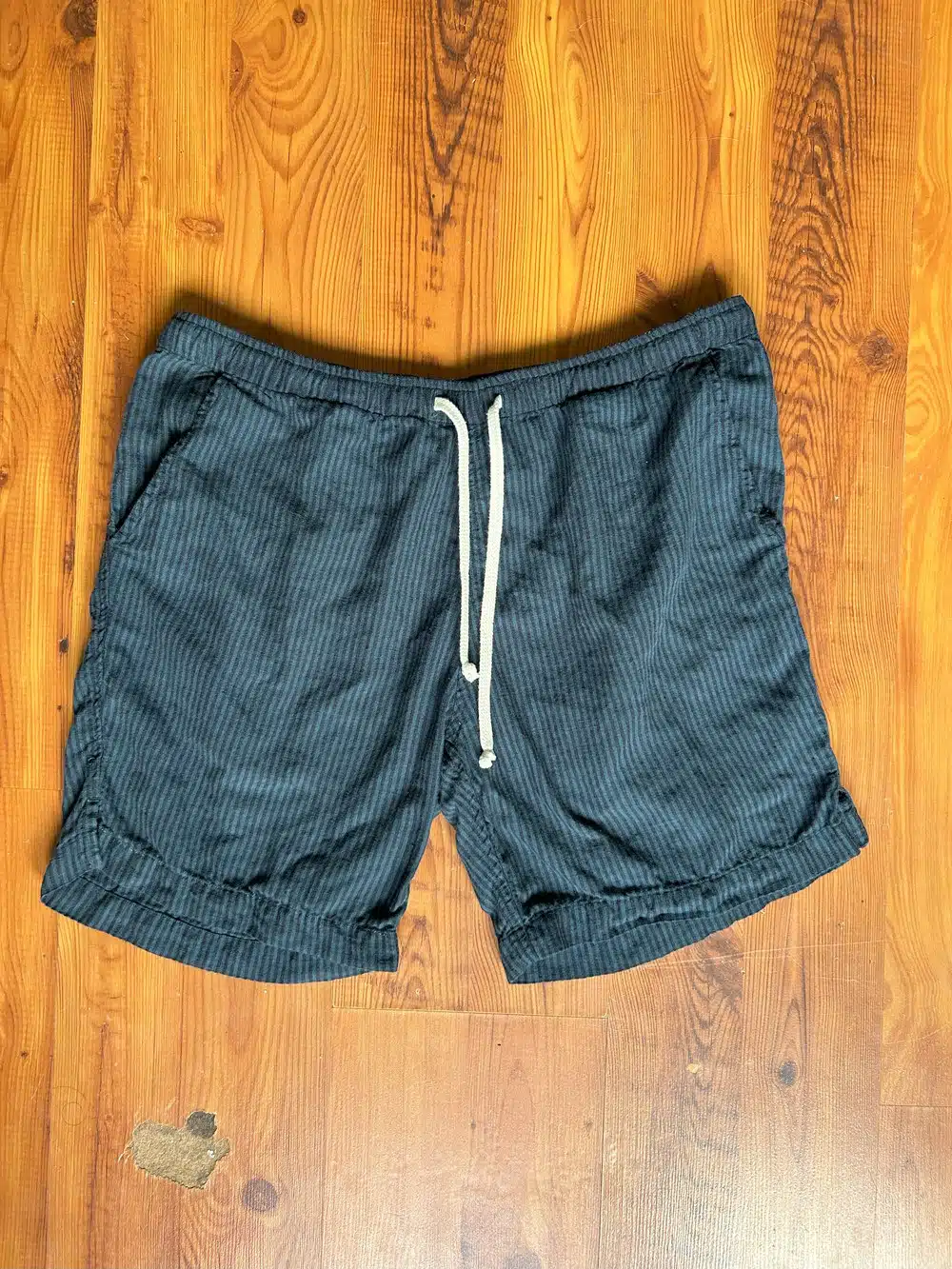
They’re a brand that really sees the problem with the clothing industry using so much plastic. Their sustainability page notes that 65% of clothing is made from plastic and that plastic is toxic and doesn’t biodegrade.
To combat this issue, the brand focuses on using natural and renewable materials like organic cotton, European linen, Merino wool, raw leather, natural rubber, cactus, and natural dyes.
There’s no greenwashing here. Alex Crane practices what they preach.
Final Thoughts
The companies explored in this article are just the tip of the sustainability/ethical iceberg. There are dozens more companies that are founded with sustainability as one of their guiding principles. Many have created interesting niches.
Most companies that care about the environment enough to take the extra steps necessary to become sustainable also care about humanity, believe in fair trade and support a cause dear to them.
We, as consumers, are lucky. We can use our purchasing power to support these companies and the good work they are doing.
We also send a clear message to others that doing harm is no longer acceptable. It will hurt their bottom line; our buying habits can help change how companies do business.
In addition to making better choices, one of the best tools we have toward sustainability is to ease toward minimalism. Buying less, buying consciously, but buying quality, non-fast fashion, means that we can keep and enjoy our clothes longer.
This saves resources…ours and those in nature. The final piece of this puzzle is to remember to up-cycle or recycle what you already own.
This keeps waste out of landfills and makes the most out of our resources. There is no reason why fashion has to be the second least sustainable industry.
Remember: look good…feel good…do good.
Have you tried any of these brands? Did we leave out any good ones? Leave a comment below!
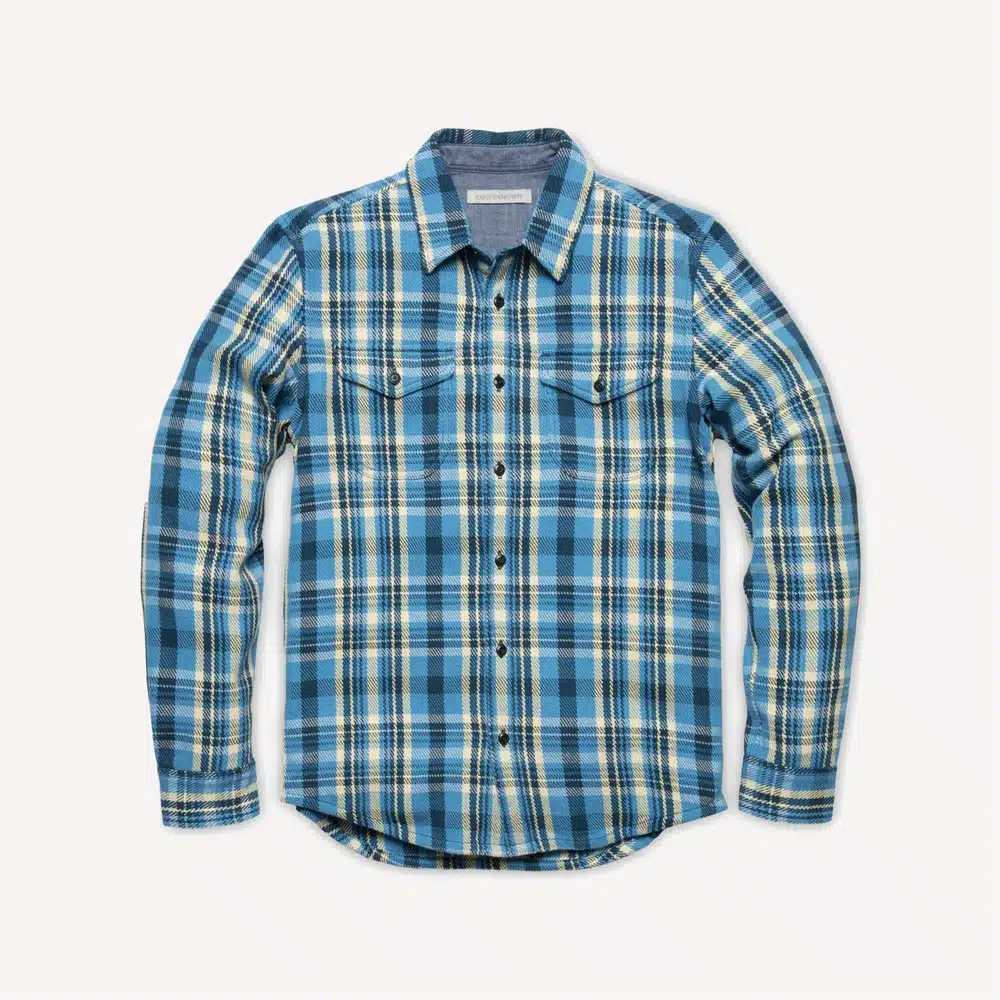
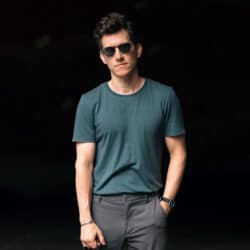
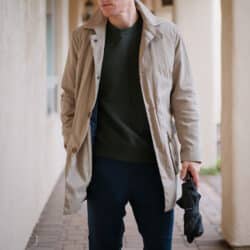
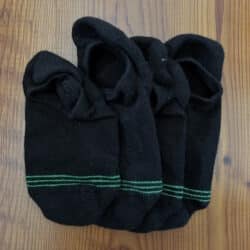
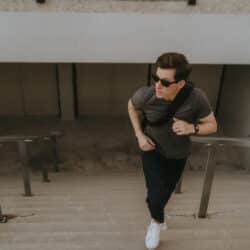


Frank and Oak is another good one.
Hey there! Love the blog, have used lots of tips for my male family members.
One thing to note-the Patagonia shirt pictured is from the Work Wear line and that line in particular runs big, so size down at least one size, maybe 2!